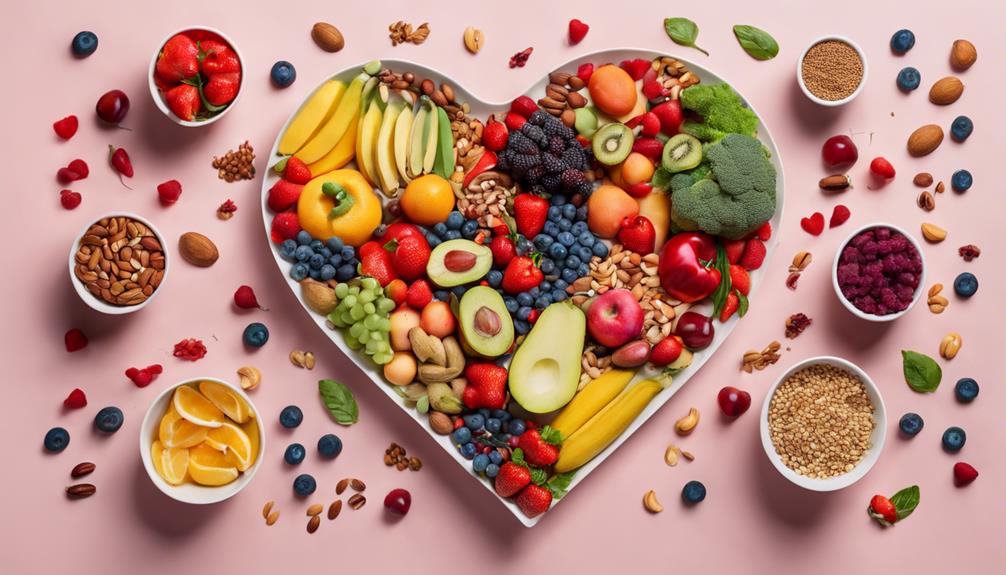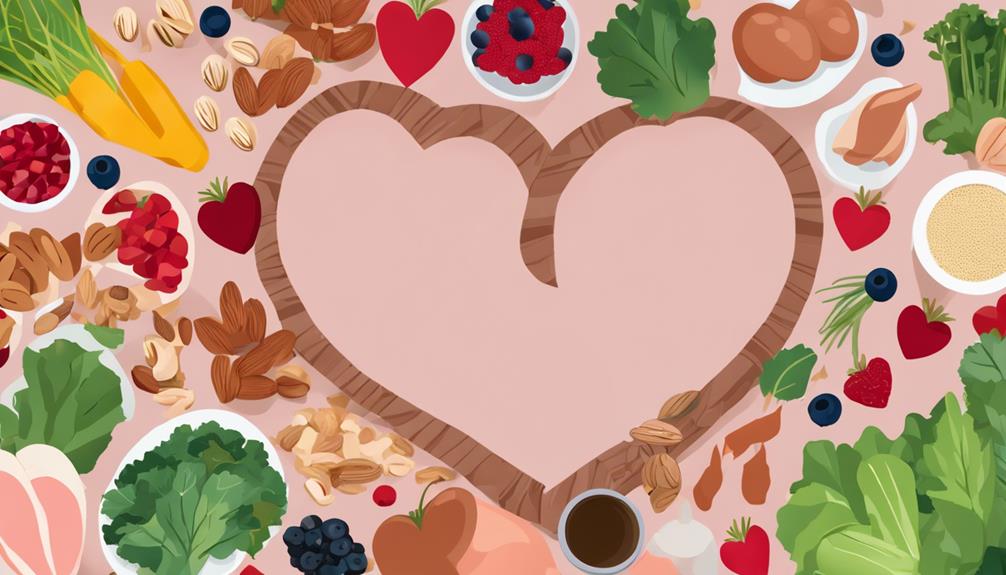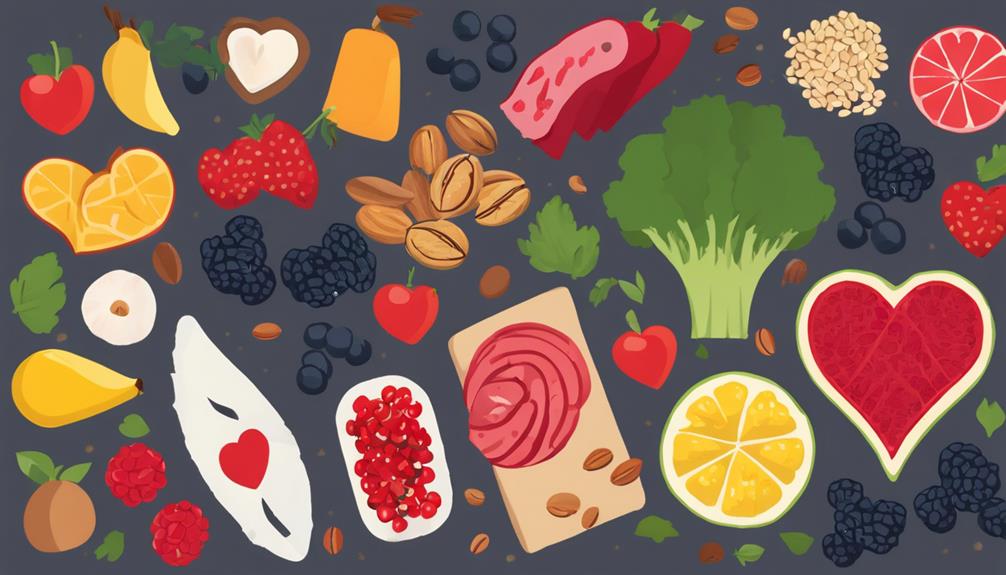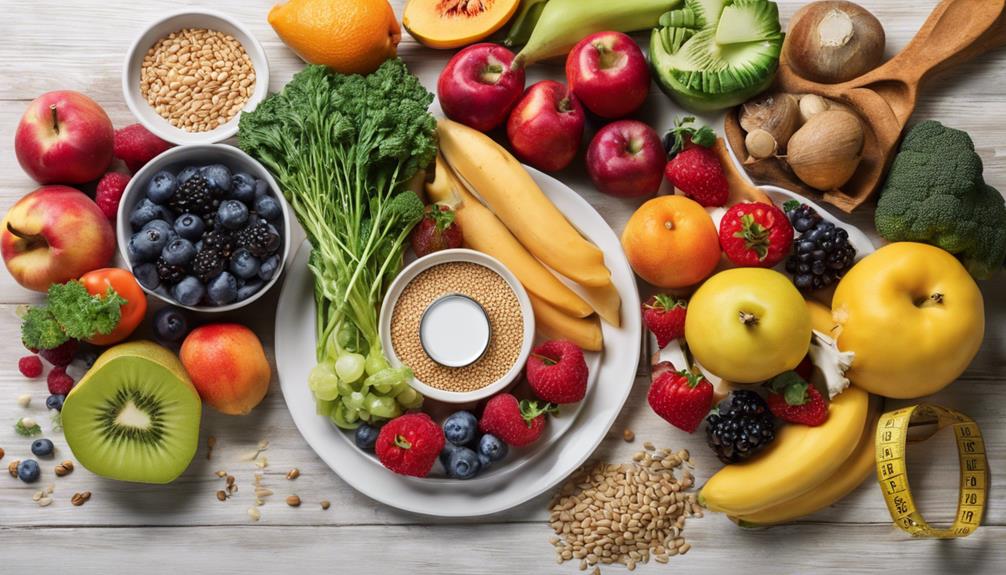How to Improve Women’s Cardiovascular Health Through Diet
To boost women's cardiovascular health through diet, you must be mindful of your food choices and opt for nutrient-rich options that promote heart well-being. Including superfoods packed with omega-3 fatty acids, antioxidants, and fiber can have a positive impact on cholesterol levels, blood pressure, and overall heart function. But what about the foods you should avoid or limit to maximize these benefits? Stay tuned to discover practical tips and key nutrients that can help you take charge of your cardiovascular health with simple dietary adjustments.
Importance of a Heart-Healthy Diet
To maintain optimal cardiovascular health, adopting a heart-healthy diet is paramount. Nutrition education plays a crucial role in empowering individuals, especially women, to make informed choices about their dietary habits. Understanding the impact of different foods on heart health can motivate lifestyle changes that support overall well-being.
A heart-healthy diet focuses on consuming nutrient-dense foods such as fruits, vegetables, whole grains, lean proteins, and healthy fats. These choices can help lower cholesterol levels, reduce blood pressure, and decrease the risk of heart disease. By incorporating these foods into your daily meals, you can proactively improve your cardiovascular health.
Lifestyle changes, such as meal planning, mindful eating, and portion control, are essential components of maintaining a heart-healthy diet. Small adjustments, like choosing baked over fried foods or opting for water instead of sugary beverages, can have a significant impact on your heart health in the long run.
Key Nutrients for Cardiovascular Health
Improving your cardiovascular health hinges on not just the types of foods you eat, but also the specific nutrients they provide. To ensure your heart stays healthy, focus on nutrient-rich choices that align with dietary guidelines.
Here are three key nutrients for cardiovascular health:
- Omega-3 Fatty Acids: Found in fatty fish like salmon and mackerel, as well as flaxseeds and walnuts, omega-3 fatty acids have been shown to reduce inflammation and lower the risk of heart disease.
- Fiber: Whole grains, fruits, vegetables, and legumes are excellent sources of fiber. A diet high in fiber can help lower cholesterol levels and improve heart health.
- Antioxidants: Berries, nuts, dark chocolate, and leafy greens are packed with antioxidants. These compounds help protect your heart by reducing oxidative stress and inflammation.
Foods to Include in Your Diet
Incorporating a variety of nutrient-rich foods into your diet is essential for supporting cardiovascular health. Superfood options like fatty fish rich in omega-3 fatty acids, such as salmon and mackerel, can help lower blood pressure and reduce inflammation. Berries like blueberries and strawberries are packed with antioxidants that combat oxidative stress and support heart health. Nuts, seeds, and avocados are excellent sources of healthy fats that can help lower cholesterol levels.
When it comes to meal planning strategies, focus on incorporating whole grains like quinoa, brown rice, and oats into your meals. These grains are high in fiber, which can help lower cholesterol and improve heart health.
Include plenty of leafy greens, such as spinach and kale, which are rich in vitamins, minerals, and antioxidants. Don't forget to add beans and legumes to your diet for their heart-healthy benefits.
Foods to Limit or Avoid
Limiting certain foods in your diet is crucial for maintaining optimal cardiovascular health. When it comes to improving women's heart health through diet, focusing on reducing sugar intake and minimizing processed foods can make a significant impact.
To support your cardiovascular well-being, consider the following:
- Sugar intake: Excess sugar consumption has been linked to an increased risk of heart disease. Limit foods and beverages high in added sugars, such as sugary drinks, candies, and desserts, to protect your heart health.
- Processed foods: Processed foods often contain high levels of unhealthy fats, sodium, and added sugars. These components can contribute to inflammation and negatively impact heart health. Opt for whole, unprocessed foods like fruits, vegetables, whole grains, and lean proteins to nourish your heart.
- Trans fats: Foods containing trans fats, often found in processed snacks, fried foods, and baked goods, can raise bad cholesterol levels and increase the risk of heart disease. Be mindful of food labels and choose products with little to no trans fats to prioritize your heart health.
Practical Tips for Success
To enhance your cardiovascular health through dietary choices, implementing practical strategies is key. Meal planning is a crucial aspect of maintaining a heart-healthy diet. Take time to plan your meals for the week, incorporating a variety of fruits, vegetables, whole grains, lean proteins, and healthy fats. This will help you avoid impulsive food choices that may not be beneficial for your heart health.
Portion control is another vital component to consider. Be mindful of serving sizes and try using smaller plates to help control portions. Additionally, listen to your body's hunger and fullness cues to prevent overeating.
When meal prepping, consider cooking in batches to have healthy options readily available. This can save you time during busy days and prevent you from reaching for less nutritious choices.
Frequently Asked Questions
Can Genetics Play a Role in Women's Cardiovascular Health?
Yes, genetics can influence your cardiovascular health as much as lifestyle choices. Understanding genetic predispositions can help tailor preventive measures. However, healthy habits like balanced diet and regular exercise play a significant role in overall well-being.
How Does Stress Impact Heart Health in Women?
Stress, oh, stress! It's like a sneaky ninja attacking your heart health. Master stress management, tap into the mind-body connection. Your heart will thank you by beating strong and steady. Embrace peace, love, and heart health!
Are There Specific Dietary Recommendations for Menopausal Women?
For menopausal women, dietary recommendations for bone health include calcium-rich foods like dairy, leafy greens, and fortified products. To manage weight during this period, prioritizing lean proteins, whole grains, and fruits/vegetables is essential.
What Role Do Hormones Play in Cardiovascular Health for Women?
Hormonal fluctuations during the menstrual cycle can impact blood pressure, affecting heart disease risk in women. For example, estrogen levels can lead to vasodilation, influencing cardiovascular health. Understanding these hormone-heart connections is crucial for overall well-being.
Is Intermittent Fasting Beneficial for Women's Heart Health?
Intermittent fasting can positively impact women's heart health. Fasting effects include improved insulin sensitivity, weight management, and reduced inflammation. It may also aid in hormone regulation, benefiting cardiovascular health. Consult a healthcare provider before starting.
Conclusion
In conclusion, by filling your plate with nutrient-dense superfoods and avoiding processed, unhealthy options, you can pave the way for better cardiovascular health. Remember, the key to a healthier heart lies in the choices you make every day. So, don't underestimate the power of your diet in shaping your well-being. As they say, "you are what you eat," and when it comes to your heart, choose wisely.












